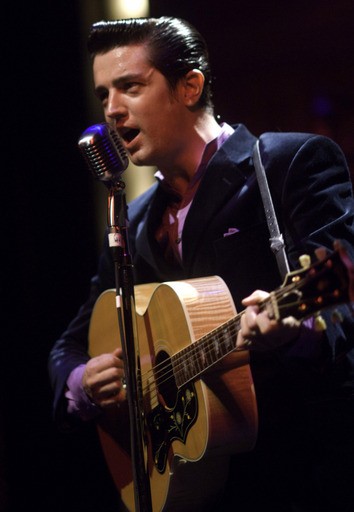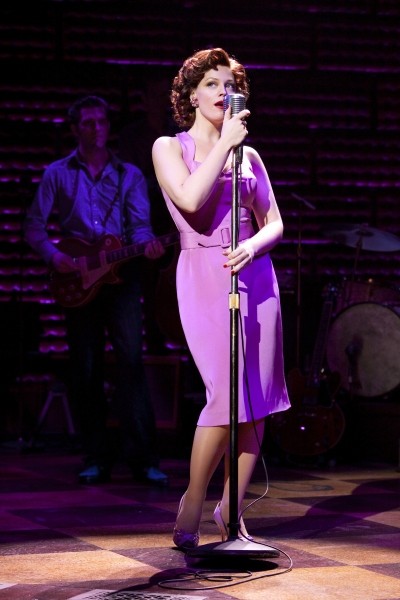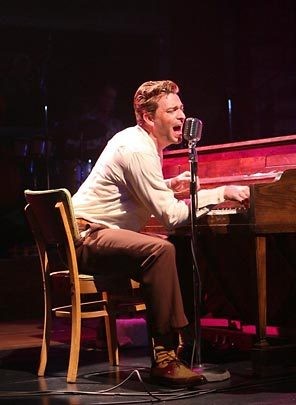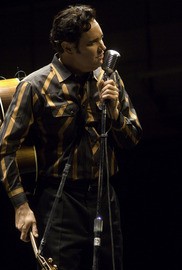Million Dollar Quartet at Nederlander Theater
Great Balls Are Afire!
By: Susan Hall - Apr 20, 2010
Million Dollar Quartet
Book by Colin Escott and Floyd Mutrux
Directed by Floyd Mutrux
Scenic Design Derek McLane
Costume Design Jane Greenwood
Lighting Design Howell Brinkley
Sound Design Kai Harada
Elvis Presley Eddie Clendening
Johnny Cash, Lance Guest
Jerry Lee Lewis, Levi Kreis
Carl Perkins, Robert Britton Lyons
Elizabeth Stanley, Dyanne, Elizabeth Stanley
Sam Phillips, Hunter Foster
Music Arrangements and Supervision, Chuck Mead
Directed by Eric Schaeffer
Nederlander Theater, New York
At the Nederlander Theater in New York, it is 1956, the year that changed pop music forever. Elvis arrived. A jam session, which would be called the Million Dollar Quartet, and the onstage musical's title, is in progress.
Carl Perkins and Jerry Lee Lewis are jamming. Perkins is angry at Elvis for singing his song Blue Suede Shoes. Sam Phillips, the record producer who discovered Elvis, had gotten permission for Elvis to record it. When Elvis sang the song on the Ed Sullivan's "Toast of the Town" he drew a staggering 80.5 per cent of the country, as Sullivan stood by making sure the cameras did not dip below Elvis' waist and muttering "Sonovabitch."
In the recreation of that December jam session, Jerry Lee Lewis is lobbying for the attention of Phillips. Phillips' Sun Records studio, the small jewel where rock was born, is dressed in red, with the signage of Urban Avenue in Memphis looming above the roof, all brilliantly recaptured by multi-Tony winning set designer Derek McLane.
In April of 1956, Elvis' Heartbreak Hotel topped the charts and until the end of the year, Elvis recordings hit number one for 25 weeks. Phillips had sold Elvis' contract to RCA for around $35,000. Now the RCA brass are courting Phillips, because they can't draw out the crisp, vibrant sound Elvis created when Phillips was in charge. Elvis misses Sam. His girlfriend of the moment, Dyanne, pleads with the producer to come to New York and help.
This musical would be a treat even if it was just jukebox, but much more is going on. The impersonation we associate with Elvis, is undertaken not only by Eddie Clendening as the man himself, but also by Lance Guest as Cash, Robert Britton Lyons as Perkins and the arresting Levi Kreis as Jerry Lee Lewis. It is a testament to the talent on stage that their impression is indistinguishable from the originals. Numbers they perform range from Down by the Riverside rising out of the spirituals sung by slaves to Hound Dog, Big Mama Thornton's 1953 hit, which became a red neck favorite.
Eddie Clendening makes you forget that when Elvis debuted Hound Dog on the Steve Allen show, he'd been forced to wear a tuxedo and sing to a terrified basset hound in a top hot. When Elvis returned to Memphis, he announced: "Those people in New York aren't going to change me none. I'm going to show you what the real Elvis is like tonight." Clendening does.
Johnny Cash, also under the Sun label in 1956, mosies around the studio. Cash's contract with Sun is about to expire, and Phillips is anxious to re-up. Cash, we learn, has made a bargain with God: If he had success (and he has) Cash would record a gospel album. Phillips won't do it, and Columbia will, so Cash plans to scuttle Sun. Who will be left at Sun? Lewis is ripe and ready.
Masquerading as Jerry Lee Lewis, Levi Kreis takes over the stage, performing on his 'pumping' piano as though it were an extension of himself. By Kreis' own report, he's been playing Lewis since he was six.
Jerry Lee Lewis had a big career, which started when his mother enrolled him in Southwestern Assemblies of God University in Waxahachie, Texas, confidant that her son would now be exclusively singing his songs to the Lord. But Lewis couldn't resist a boogie woogie version of My God Is Real at a church assembly and was sent him packing moments later.
Lewis' ambition is palpable. He hardly seems to notice his giant competitors. Elvis has no star arrogance. This is the kind of session he loved, a bunch of pals jamming to get ready for a recording. Not so much of the 'twirling dervish of sex" is in evidence. Elvis is glad to be home.
Bob Johnson, a reporter for the Press-Scimitar was on hand to write up the Million Dollar Quartet session. Sam Phillips taped for the record. We know what went on. Million Dollar Quartet, the musical, captures the mood perfectly.
Lewis rakes his hands up and down the keyboard and even stands on the instrument. Lewis is credited with adding piano to rock and roll bands. It's not surprising to learn that he set a piano on fire at the end of a live performance, in protest to being billed below Chuck Berry. He is on fire.
In addition to depicting a defining moment, like a Cartier-Bresson snapshot, the show is a touching portrait of the relationship between a man who discovers and promotes a new style and his stable of performers at various career stages, bucking, embracing, yearning for Phillips' guidance.
A seminal event, this session. Great Balls of Fire are all up there afire on the stage. This evening is hot, as hot as "Fever" which the girlfriend on Elvis' arm, performs with even more raucous sexuality than Peggy Lee. Elizabeth Stanley, as Dyanne, was plopped into the earlier version of the musical, but here she is carefully woven into the fabric and wonderful.
Our modern rainbow world start in places like Sun studios. Phillips, when he first heard Elvis, said, "At last a white man who sings like a Negro." Southern DJs wouldn't play Elvis' recordings because they were convinced he was black. Elvis had it all: strands of black and white, religious and secular, regional and national woven together in the new rock and roll
Watching an African American entertainer in Las Vegas imitate his backbend posture, Elvis kept yelling at his agent Colonel Parker that the man was better than he was. Colonel Parker told him to shut up. He wasn't supposed to be promoting the competition.
You don't have to have been there to love this evening, but I was reminded of school days. One classmate's Mom had played Elvis' Mom in a film. When Mildred Dunnock would visit school, we would all faint, because she was Elvis-by-contact.
Even Ed Sullivan came around, announcing to his audience that Elvis was "a real, decent fine boy." Which does not stop Scarlett O'Haras from going into a faint at the mention of Elvis' name. Outside the fairgrounds where Elvis sang, people fainted so they would be carried into the soldout performance.
Leaving the theater, I brushed up against Elvis' stand-in and grabbed my smelling salts. Love doesn't have to be in good taste, but Million Dollar Quartet sure is.






